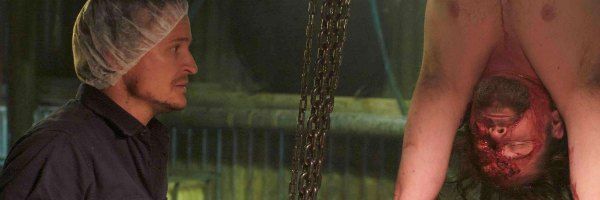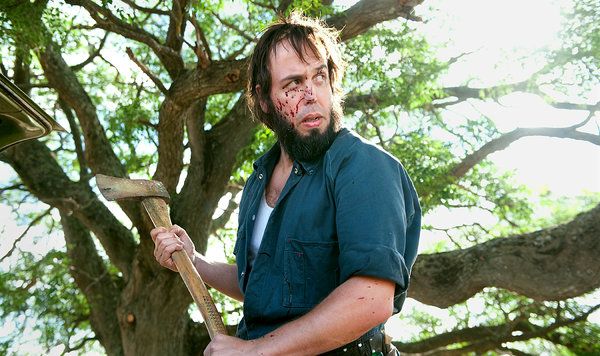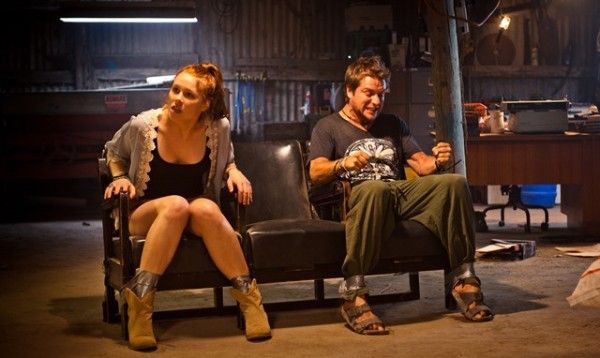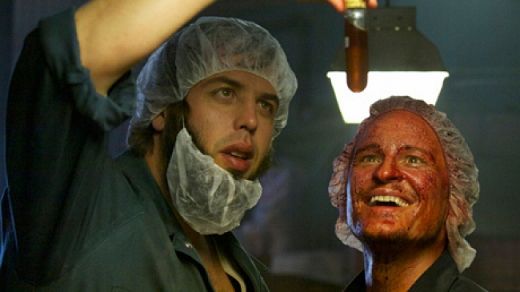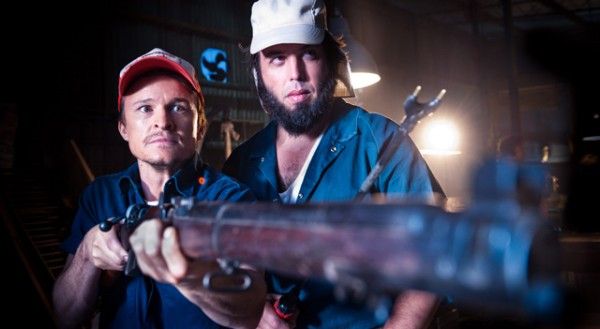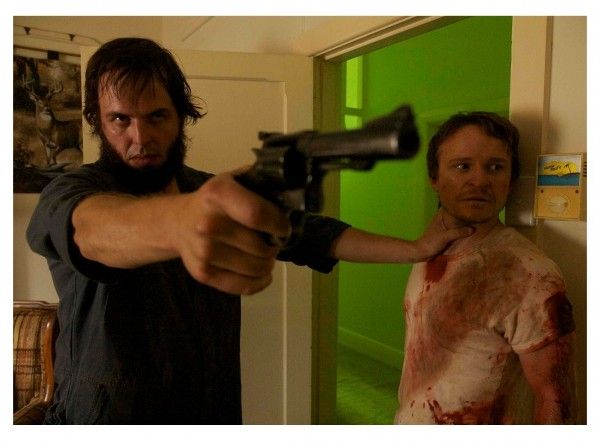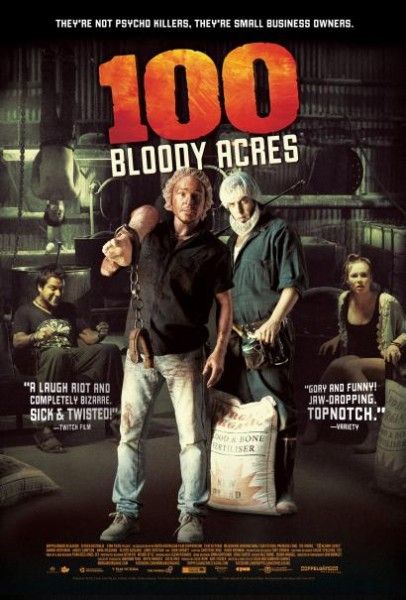You don’t often get to call a horror film delightful, but 100 Bloody Acres is a one-of-a-kind movie that definitely fits the descriptor. The Morgan Brothers have just discovered the missing ingredient to the perfect bone and blood fertilizer blend – people parts. When the hapless Reg (Damon Herriman) finds a car crash victim on the side of the road he sees an opportunity to fill an important order and impress his domineering older brother Lindsay (Angus Sampson), but on his way home Reg finds a trio of broken down travelers, and smitten with the beautiful Sophie (Anna McGahan) he foolishly offers them a ride. Of course everything goes to hell when they find the body in the back of the truck, and what follows is an absolutely charming mess of blood and body parts with a surprisingly warm-hearted story about finding out who you really are. 100 Bloody Acres also stars Oliver Ackland, Jamie Kristian, John Jarratt, and Chrissy Page.
At the film’s recent L.A. press day I participated in a group interview with Herriman, Ackland, Kristian and McGahan. They talked about working with writer/directors Colin and Cameron Cairnes, the strength of the script, the tight-knit cast and crew, the physical demands of the film, the unique tone of the film, and more. In addition Herriman spoke about his work on The Lone Ranger. Check out what they had to say after the jump. Please be aware that there are some spoilers.
When you guys read for the film, were you aware of what parts you were reading for?
DAMON HERRIMAN: I was.
OLIVER ACKLAND: I think we were, yeah.
JAIME KRISTIAN: Yeah, I actually was as well. I actually might have had an option to read for James.
ACKLAND: Did you actually read?
KRISTIAN: No.
HERRIMAN: I think that they had such a clear idea of who the characters were, and I think when it came to casting they also had such a clear idea of the people they want to see for each particular character. I think that’s what’s great about the script is that the characters are all so clearly defined that it’s not just a matter of, “Oh let’s get a bunch of young male actors and test for everything.” There are very specific characteristics to each character and I think that that’s why they got people in who were the people they knew would be right for the part.
But what’s great about your characters is that even though they are very specific each of you has a great arc, we see growth and development with each of the characters, which is something you don’t often see in films of this nature.
KRISTIAN: I think that’s one of the strengths of this script from the very beginning, the fact that each character does have their own kind of really nice arc and each character kind of goes through a pretty dramatic change as well at some point. I think that is one of the main reasons that the script is strong.
HERRIMAN: It’s evident from the first time you read it, and that does set it apart, because with this kind of film the characters would normally have a few less dimensions going on.
ANNA MCGAHAN: Well you have to be able to kill them, but the beauty of this, I think it’s a testament to their writing, they’ve built it in such a way that it’s difficult to kill any of them. You’re connected to all of them.
These are very physically demanding roles, I doubt that the budget had room for you guys to have a stunt double every time you got shoved in the trunk or hung upside down or something. What was it like for you guys shooting those more practical stunts?
ACKLAND: I mean the hanging upside down stuff, I think initially we were supposed to do a lot more of it. Like my character was hung upside down for the majority of the film. I think they watched the rushes and they just couldn’t understand a fucking word I was saying so they kind of rewrote it so they put me down off the hooks and I was laying down on the slab there.
HERRIMAN: For Oliver, who was hung upside down the most, when you see someone hanging there you go, “Oh that looks okay.” But because you’ve got your whole body weight being hung by your ankles it really ends up hurting and messing with your head and your eyes. It was amazing that you put up with that.
ACKLAND: I think we all gave it a go together before we started shooting just to see how long we could last and it wasn’t very long.
HERRIMAN: I think it was like two or three minutes or something
ACKLAND: Before your head feels like it’s about to explode.
And then your mouth was duck taped on top of that.
ACKLAND: [Laughs] yeah
Which reduces breathing capability
ACKLAND: I liked it. The tighter the better, the tighter the better, you know?
KRISTIAN: And then he’s dunked under
HERRIMAN: You were actually dunked?
KRISTIAN: Yeah, right in, head first.
ACKLAND: Yeah, that was me.
KRISTIAN: They genuinely submerged him under the water with like cotton stuffing in your nostrils to stop it going up. He had tape over his mouth so if he got anything up there we’d have a death on our hands – a real one.
ACKLAND: I had a sugar high for like a half hour afterwards.
I saw this as more of a crime movie than horror, do you think that’s the Aussie way of doing it as opposed to the US?
HERRIMAN: I mean Wolf Creek is an Aussie movie that’s very much a horror movie. I think it’s probably more the Cairnes brothers’ way of doing it.
MCGAHAN: Yeah.
HERRIMAN: Yeah, there’s a lot of gore but there is that crime story and obviously the comedy as well that make it a little different. I think the main thing that separates it from a US film is the tone of the sense of humor. It’s a very Australian sense of humor, but what was really nice last night when we watched it with an American audience, was that they got everything that the Australian audience did, which was great.
ACKLAND: Except Rebecca Gibney.
MCGAHAN: They were just explaining to us that hillbillies are the same no matter where you go.
Tell me something, at the end Sophie couldn’t have bought that diamond ring he gave her, right? I mean you just met this guy, he ties you up, he’s about to kill you and at the end of the day he hands you a diamond ring. He didn’t go to the store or anything.
HERRIMAN: Well that’s the diamond ring-
ACKLAND: He’s just knicked it off my character.
HERRIMAN: He’s actually just handing it back.
MCGAHAN: It’s sort of left open with this allusion to-
HERRIMAN: It’s an allusion to something else, but it’s actually him going “Oh, I forgot. Here’s your ring,” but given everything that’s come before it has a suggestion of romance. It’s meant to be in the audiences head kind of like a proposal, but actually all he’s doing is handing her ring back.
MCGAHAN: It is a recognition of something genuine as well. The whole time she’s living these double lives and she’s not enjoying the life she’s in. her past is sort of deeply centered in his world and it’s coming back to that place. It’s like, “Alright, this is who I actually am.” So I really like that element of her journey where she just kind of takes the ring and sees this guy for who exactly who he is and just comes full circle- well not full circle, a total 180 actually.
KRISTIAN: I always really like that ending as well. It’s almost sort of, when you see it for the very first time, kind of suddenly it’s there. It comes almost out of the blue to a certain extent. And it’s just, I thought, a really quaint quirky almost happy ending to a quirky little horror movie.
HERRIMAN: Yeah, if the film kept going I’m sure she’d go, “Thanks Reggie.” And he’d go, “Yeah, sorry I meant to give that to you earlier.” She’d go, “Let me help you down.” And they wouldn’t mention the ring again, but since we cut it that way it does leave you with the idea of someone proposing marriage.
Damon, hasn’t a part of your time recently been spent on a little movie called The Lone Ranger?
HERRIMAN: The Lone Ranger, yeah, a very small role, but I did about fifteen days over about five months [laughs]. That was massive, kind of the complete opposite experience to this one. It was the biggest experience on a film set you can imagine.
How was the feature film experience, because I know some of you have been big in Aussie television so how is it jumping into a feature film situation?
MCGAHAN: It’s just wonderful because you have one story so the focus is primarily on the script. It isn’t your character over the course of three seasons or your audience it’s just – this is the script, and the strength is the script, so you can really put yourself into that. We rehearsed a lot and we were given time to actually – it was a small budget comparably, but we were given time to really work these scenes. That’s always appreciated. It’s time and there’s a real focus to that I think. The directors are so invested in their projects, what they’re doing, and so passionate about the genre and about how we all work together that we had such a fantastic family vibe on set. It was an amazing time in Adelaide.
KRISTIAN: Yeah, it was really, really good.
HERRIMAN: It was the five of us, Angus Sampson who plays Lindsay, the five of us hung out a lot. At the start of the shoot Angus was like, “I think I shouldn’t have much to do with the kids because I want to be intimidating.” And that lasted about three days. We were hanging out because we all got on so well.
Damon, what was it like working with Johnny Depp? Did you see him?
HERRIMAN: I didn’t work directly with him, but yeah I saw him walking around and stuff. It’s pretty surreal being on a set and seeing Johnny Depp walk by [laughs]. It was a really good bunch of people actually. Gore Verbinski, the director, was amazing.
So how would you compare your directors here to Gore Verbinski?
ACKLAND: Light years ahead.
HERRIMAN: [Laughs] Yeah, yeah. Well, I think they’re all supremely talented in their own way. Gore is obviously a master of these sorts of massive blockbusters and has a visual style that’s incredibly unique. But Colin and Cam I just have so much respect for because the difference between the budgets of those two films couldn’t be more different. You could probably make 200 of ours to get one Lone Ranger. To think that the end result still feels like the film I read on the page, it doesn’t feel like it’s skimped in any way, it doesn’t feel like it was rushed in any way, even though it often was. I just think they have a very unique voice, a very unique sense of humor and I think they’ve made something that’s got elements of many other things, but there’s nothing quite like it.
You mentioned the unique sense of humor in the film, how did you guys strike the right tone between the more sort of slapstick moments with the more sincere character moments?
KRISTIAN: As with anything, it’s almost a cliché, but it comes from playing things truthfully. And the script was sort of so outrageous and big it allowed those moments, well for me particularly as Wes to really go for them in these moments that came from a truthful place they still seem to sort of fit within the sort of landscape of the film.
There’s a rather shocking reveal towards the end of the film about the aunt.
KRISIAN: [Laughs] That gets a roar, that gets a roar very time.
HERRIMAN: That is – you know there have been some unpredictable moments in films in the history of cinema, but no more unpredictable than that. You could say, “You’re not going to guess what happens.” You’d still rack your brain to think what it would be, but there’s no way anyone could guess that moment. I always love that moment in the film because it’s one shot from the moment I walk into the door of the house and, actually that moment you’re talking about is probably 60-70 seconds later. That scene had to be choreographed perfectly so that the timing worked out just right. Yeah, watching it with an audience is always a great moment because you know that the moment that reveal happens that the audience is going to have that reaction of complete shock.
Do you guys think the world has gotten a lot smaller now with Netflix and everything? Now we can watch Australian shows or BBC stuff, it’s not like you have to go find it, it’s readily available for everybody now.
ACKLAND: Especially for little films like ours it means that people will get to experience it, whereas 5-10 years ago they just wouldn’t have seen it because they didn’t go to the one or two cinemas where it’s playing out here. It’s great.
HERRIMAN: With Twitter and everything people can hear about these things and find them on Netflix or whatever, it hopefully means that a film like this will get a much bigger audience than 10 years ago.
Were there any ideas that you guys really wanted to work into the film that you weren’t able to?
KRISTIAN: We had a lot of ideas for Wes tripping. We had stuff coming out of our ears, but we only had about three hours to shoot so we got about 1/10 of the stuff. It was by far enough anyway, but yeah, time constraints, that was the one major thing for me.
HERRIMAN: Yeah, every day you kind of wished you had another couple of hours at the end of the day.
KRISTIAN: I think there were days, it didn’t really affect our characters, but I know Colin and Cam because of time constraints would have to drop shots on a number of occasions, almost every day.
ACKLAND: Yeah, I actually had a rap scene initially that I was quite looking forward to, which got cut.
MCGAHAN: That’s right.
ACKLAND: It was my audition scene, just basically rapping Eminem. Basically I think they just couldn’t afford the Eminem song [laughs].
At the end of the day now that this is in the can, you’re in the states promoting the film, what have you taken away from the process of making this movie?
HERRIMAN: Great friendships firstly, these guys, Colin and Cam, and Angus, who played Lindsay, definitely we’re all really great mates now. For me it was kind of a perfect acting job, everything about it. Like if I had to check all the boxes of what you want in a job when it comes to the roll you get to play, the script in general, the dialogue, the crew, the people you got to work with, and how it all turned out, this checked every box for me. It was like a perfect experience. I loved doing it and I love how it turned out.
KRISTIAN: I don’t want to jump on that bandwagon too hard, but I kind of have to because if I think about the overall experience – I only lived in Australia for about a year when we shot it, I’m from London originally, and the whole thing was a really special five weeks. It was a perfect sort of moment in my life in South Australia shooting a great film with an awesome bunch of people. And we’ve ended up with a really good little film.
MCGAHAN: I just took away from it, all of those things, but also just the commitment that the directors – and the writers made to specificity in the script and the genre. They didn’t compromise, not for anything, and it’s really genuine for that reason. I really respect what they’ve made for that reason. It was really exciting to be part of that because it is eccentric and different. It’s not sticking to any sort of mold. For that I just got a lot out of it about filmmaking and genre.
HERRIMAN: And the film has heart, which is such a weird thing for this genre. There can be films where there’s a sort of fake sentimentality, but this film I find we genuinely do feel something for these people. There are moments where I actually feel quite moved watching, which is a weird thing in a horror comedy. I think that reflects the script, but also the fact that we all get on so well.

